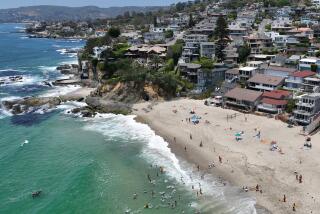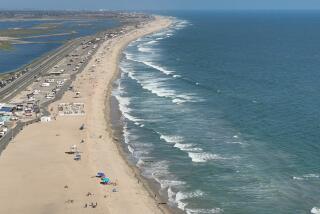Many Boaters Suspected of Using Harbors as Sewer
Boating, a popular pastime for many county residents and a symbol of the areaâs affluence, is also helping to transform two of the countyâs three harbors into virtual septic tanks, authorities say.
Negligent boaters, disregarding state and federal laws, for years have been emptying their on-board toilets into Huntington Harbour and Newport Bay, exposing swimmers to diseases and killing sea life, officials say.
âItâs a real problem,â said Gerald G. Johnston, a deputy district attorney specializing in environmental crime prosecution. âThere are indications that a number of boats in the area are doing this, although itâs not permitted by law.â
Boaters can legally dispose of on-board wastes by either dumping at sea or hooking up to a sewer system at harbor pump stations. Most comply, officials said, but a handful of violators have caused the growing pollution problem.
âThe attitude is that (dumping) once wonât hurt. But once does hurt,â said Sgt. Harry Gage, harbor master of the Sheriffâs Department.
The problem, authorities said, is enforcing the law. Unless violators are caught dumping, it is virtually impossible to prosecute them.
Until federal law was amended three years ago, local agencies depended upon federal law-enforcement agencies to monitor and cite offenders. Since then, however, Newport Beach has adopted five ordinances enabling the city to prosecute offenders, officials said.
And the Huntington Beach City Council introduced an ordinance Sept. 17 that would impose strict guidelines for dumping, along with tough penalties for violators. The council is scheduled to consider adopting the measure Oct. 1.
âHead dumping,â as many authorities refer to the problem, in recent years has been suspected as a leading cause of the harborsâ exceedingly high levels of coliform bacteria, produced by human or animal fecal matter.
Samples taken from the harbors in the last five years have consistently shown coliform levels exceeding state standards, according to a recent report compiled by the Orange County Health Care Agencyâs environmental division.
According to state regulations, coliform levels exceeding 1,000 organisms per 100 milliliters of water are unsafe for swimming and other water sports. Samples taken from some of the harborsâ monitoring stations in April, May and June this year revealed levels up to 16 times that standard, the report said.
Newport Bayâs waters are by far the most sullied by coliform, the study shows. During May, for example, 11 of its 27 stations reportedly produced contaminated samples at least 20% of the time, identifying those sites as not complying with state regulations.
During the same month, two of Huntington Harbourâs 12 monitoring stations consistently revealed high levels of contamination.
Orange Countyâs third harbor, Dana Point, has had coliform levels that have met state standards throughout the last five years, according to the report.
Authorities say that county residents who wash animal fecal matter, organic fertilizer and similar substances into gutters along the streets create much of the coliform pollution, since storm drains empty into both Huntington Harbour and Newport Bay. Consequently, contamination levels are typically much higher after rain, the study showed.
But officials have long suspected that waste dumping by commercial and recreational boats has also been a chief contributor to the problem, although few violators have been caught in the act.
âWe donât know thatâs the case, but there is at least a perception that vessel waste is a problem,â Sgt. Gage said.
It is impossible to differentiate between the sources of contamination, but Gageâs staff has occasionally turned up evidence, such as toilet tissue in the water, that point to vessel dumping, he said.
Johnston said Coast Guard inspections have shown that the waste systems of many boats are set up so it is possible to dump wastes easily and quickly into the harbor with little chance of detection.
One of the rare occasions in which a violator was actually caught illegally dumping occurred in Newport Bay earlier this year, when a charter boat expelled its waste on top of an unsuspecting scuba diver, Johnston said.
The diver pressed charges and Johnston successfully prosecuted the boat owner, who was fined.
No offenders have been caught, Johnston said, in Huntington Harbour, which is part of Huntington Beach. City officials hope that their proposed ordinance will help identify violators.
The ordinance would mandate that all boat owners renting slips in Huntington Harbour place dye tablets in their on-board waste tanks. Any discharge would expel a deep green cloud into the water, making it easier to spot illegal dumping.
The boat-slip lease or harbor rental agreement would automatically be revoked for any owner whose vessel, upon inspection, lacked the dye tablets. Also, any harbor operator whose boat tenants do not have active tablets in place would risk losing his conditional-use permit, which the city controls.
The proposal is based upon regulations in effect for the last two years at Santa Catalina Islandâs Avalon Harbor, Huntington Beach Councilman Jim Silva said.
Silva is the chairman of the Huntington Harbour Water Committee and has led the drive for the Huntington Beach ordinance.
âThis would give us a vehicle of enforcement to go after these people,â Silva said. âFor example, if someone (who is dumping illegally) has a rented dock at Peterâs Landing, we can go after Peterâs Landing by pulling its use permit.â
When asked to comment on the stringent proposal, Linda Rouan, marina operator at Peterâs Landing, declined to comment.
Local authorities said Avalonâs ordinance, which fines violators and bars them from the island harbor for a year, has been highly effective.
âIn Avalon, though,â Gage said, âcity employees have been charged with putting tablets in the (boat) tanks, so itâs been very costly. But this Huntington Beach ordinance is very innovative. By placing the onus on the marina operators, it causes them to become more involved.â
However, some critics remain skeptical. Louann Murray, a Huntington Beach biologist and member of Amigos de Bolsa Chica, an environmental group, said: âYou still have to be watching (a violation in progress), and you have to have boat ownersâ compliance, so I donât see how it will be enforceable.â
John Ludvigsen, environmental officer for the Newport Beach Police Department, said he believes that the ordinance may be effective in Huntington Harbour.
More to Read
Sign up for Essential California
The most important California stories and recommendations in your inbox every morning.
You may occasionally receive promotional content from the Los Angeles Times.










